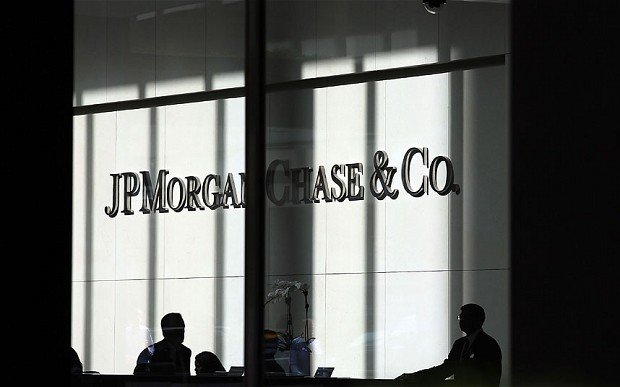
JP Morgan Chase has agreed to pay four regulators $920 million relating to a $6.2 billion loss incurred as a result of the “London Whale” trades.
Under the settlement, $200 million will go to the US Securities and Exchange Commission (SEC) and $215 million to the UK’s Financial Conduct Authority (FCA).
As part of the deal JP Morgan admitted violating US federal securities laws.
Traders at JP Morgan’s London office built up huge losses in derivatives trades at the beginning of last year.
Two former JP Morgan traders face criminal charges in the US relating to the case.
They deny charges of lying about the size of their trades in order to hide their mounting losses.
In a statement, the SEC said there had been failings in JP Morgan’s internal controls and in senior management.
The regulator said the bank – whose chief executive Jamie Dimon once described the trading problems as a “tempest in a teacup” – had admitted the facts underlying the SEC’s charges.

“JP Morgan failed to keep watch over its traders as they overvalued a very complex portfolio to hide massive losses,” said George Canellos, co-director of the SEC’s division of enforcement.
The Wall Street firm, one of the biggest investment banks in the world, is paying $300 million to the US Office of the Comptroller of the Currency (OCC), and $200 million will go to both the Securities and Exchange Commission (SEC) and the US Federal Reserve.
A further $215 million will be paid to the UK’s Financial Conduct Authority as part of the global settlement.
It said JP Morgan’s conduct “demonstrated flaws permeating all levels of the firm: from portfolio level right up to senior management”.
Tracey McDermott, the FCA’s director of enforcement and financial crime, said the failings had undermined trust and confidence in the UK’s financial markets.
“This is yet another example of a firm failing to get a proper grip on the risks its business poses to the market,” she said.
“Senior management failed to respond properly to warning signals that there were problems.
“As things began to go wrong, the firm didn’t wake up quickly enough to the size and the scale of the problems. What is worse, they compounded this by failing to be open and co-operative with us as their regulator.”
The London Whale was the name given to then-JP Morgan derivatives trader Bruno Iksil, who is believed to have racked up the losses and is now co-operating with authorities in criminal cases against other traders.
The bank’s chief investment officer, Ina Drew, stepped down following the revelation of the losses in 2012.
Jamie Dimon, whose “tempest in a teacup” comment in April 2012 prompted criticism he was underplaying the affair, said in a statement on Thursday the bank “accepted responsibility and acknowledged our mistakes from the start”.
“We have learned from [our mistakes] and worked to fix them. We will continue to strive towards being considered the best bank – across all measures – not only by our shareholders and customers, but also by our regulators,” he said.
“Since these losses occurred, we have made numerous changes that have made us a stronger, smarter, better company.”
[youtube pn715XXnqzY]